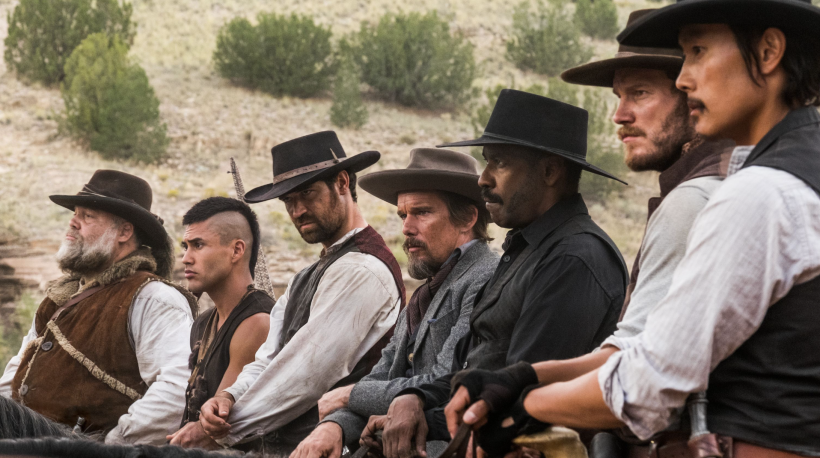
*** out of ****
Rated PG-13
(for extended and intense sequences of Western violence, and for historical smoking, some language and suggestive material)
Released: September 23, 2016
Runtime: 132 minutes
Director: Antoine Fuqua
Starring: Denzel Washington, Chris Pratt, Ethan Hawke, Peter Sarsgaard, Vincent D’Onofrio, Haley Bennett, Byung-hun Lee, Manuel Garcia-Rulfo, Martin Sensmeier
David Ayer wrote Training Day. Antoine Fuqua directed it. In 2016, between the two, Fuqua made the better suicide squad.
Yes, this is a remake of a remake, a western derived from a classic that was inspired by a masterpiece. If a viewer fell into the (admittedly) easy trap of comparing The (new) Magnificent Seven to 1960’s version or Kurosawa’s original 1954 Seven Samurai, then sure, it might come up wanting. But viewed in the vacuum of its own merits, this slightly-reimagined Magnificent Seven is an epic sized Old School oater that crosses over as a thoroughly satisfying mass appeal entertainment (albeit with a borderline R-rated gruesome streak).
With no compulsion to post-modernize the genre, The Magnificent Seven is a Western that relishes being a Western.
The characters are different in name and temperament (the leader is an African-American, twenty years removed from slavery; the villain is a greedy white man, not a Mexican bandolero), but the construct is basically the same: when a settlement of late 19th Century farmers are terrorized by a ruthless (and well-armed) industrialist making a land grab of their gold rich territory, the townfolk pool what little money they have to hire a band of motley Western renegades to save them.
Each one fits a standard archetype, but thanks to a sharp and witty script co-written by Nic Pizzolatto (the True Detective mastermind) and a charismatic cast, these simply drawn gunslingers (along with a blade wielder and arrow shooter) rise above caricature. They’re an engaging group of funny, likeable anti-heroes who quickly bond over vengeance-driven altruism (which is about as close to a virtue as they get).
The plot follows a recognizable but successful template, too, expertly designed with setups and payoffs. Its primary purpose is to entertain (and boy does it), yet it never undercuts the true threat of the villain (a perfectly sadistic Peter Sarsgaard, whose menace ominously lingers even during a long absent stretch) or the underlying high stakes and their occasional, sobering consequences. It can get violent as well, not just with general gunplay but specific point-blank murders, hatchets hurled into torsos, piercing arrows, and multiple stabbings.
This is the third collaboration between Fuqua and Denzel Washington, and the first Western for both. They slide into the saddle with impressive ease, even a confident swagger, as if this was far from their first rodeo. It’s not too far removed from the urban action dramas they’re known for, actually, yet Fuqua still embraces the sweeping John Ford vistas, and then puts a bit more adrenaline into the camerawork for an extra punch (all shot on film, not digital). Fuqua has been an inconsistent filmmaker over the years, but this is easily one of his best, most assured efforts.
Washington carries gravitas with a wink and a smirk as well as anyone, and Chris Pratt brings balance as the comic co-lead with a sneaky edge. Ethan Hawke and Vincent D’Onofrio provide the rich, colorful character roles, as Hawke layers latent Civil War PTSD underneath a gregarious persona and D’Onofrio concocts a hilarious high-pitched wispy voice that belies how brutal he can flip.
The remaining minority trio – an Asian, Mexican, and Native American – are less prominent but still integral, and the respective actors give each one enough kick to elevate them above token – but it’s Haley Bennett that breaks through. A relative no-name who fills the damsel-not-in-distress role, her grieving widow recruits the seven (and is determined to fight right alongside). With fierce conviction, Bennett boasts a strong screen presence well beyond her surface beauty. If this doesn’t end up being a career breakthrough for her, she sure is on the cusp of one.
For avid fans of film music, The Magnificent Seven also provides the final score of legendary composer James Horner who passed away over a year ago. By inspiration and perhaps providence, Horner surprised Fuqua with an entire first draft of compositions based on the script alone (virtually unheard of), just shortly before Horner’s untimely death in a plane crash. Simon Franglen helps flesh out the final work heard here, but for those familiar with Horner’s style (most iconically rendered in Braveheart and Titanic) they will recognize his signature sound from start to finish.
The Magnificent Seven runs well over two hours but never drags, including a climactic final act that stages one of the most prolonged shootouts you’ve ever seen. It unfurls with endless invention and kinetic flare, not the overlong redundant visual blur that many modern bloated tentpoles fall prey to. This is superbly crafted Hollywood moviemaking, with a high rewatchability factor going for it. While the end provides a definitive closure, this could end up being such a crowd pleaser that the studio may be quick on the trigger to shoot Magnificent Eight and Nine.